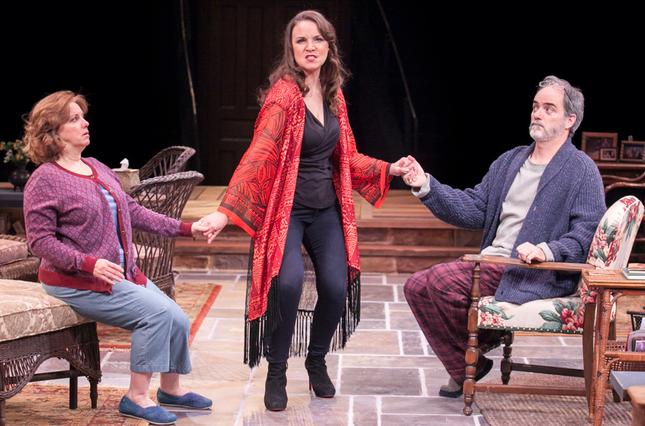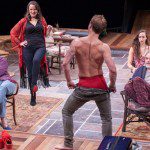‘Vanya and Sonia and Masha and Spike’: Audience Grabbers at Arena
By • May 21, 2015 0 1523

Anton Chekhov, the great Russian playwright of comedic melancholy, is either spinning in his grave or sporting a modest smile these days.
His mostly 19th-century plays, which chronicled the decline of Russia’s privileged and landed classes, remain a source of fascination for 21st-century playwrights and — more important — 21st-century audiences, especially in Washington.
First, there was “Stupid F—–g Bird,” a take on “The Seagull,” staged twice at Woolly Mammoth Theatre, followed by “Life Sucks,” a riff on “Uncle Vanya” at Theater J last season. Both were written by director-playwright Aaron Posner.
Posner is also directing “Vanya and Sonia and Masha and Spike,” the Tony-Award winning play by Christopher Durang now at Arena Stage. At the same time, we have “Uncle Vanya” itself, by way of playwright Annie Baker who’s modernized the language for this production at Round House Theater which features an all-star cast that includes Joy Zinoman (who in her time as founder and artistic director of Studio Theater, staged and directed an award-winning production of “The Three Sisters”).
Round and round it goes. There is even a comedic production—by way of the New York Three-Day Hangover Theater Company called “Drunkle Vanya” at the Pinch Bar on 14th Street through April 25.
For the play that probably contains more references to—and probably reverence for—the Chekhov canon, you have to go to “Vanya and Sonia and Masha and Spike,” hereafter referred to as VSMS, in the theater-in-the-round confines of the Fichandler at Arena Stage.
Christopher Durang remains one of the most scathing, full-of-surprises satirist and comedic playwrights in American theater. In plays like “The Wedding of Betty and Boo,” “Sister Mary Mary Ignatius Explains It All For You” and “Beyond Therapy, ” he displayed a sharp eye on American culture. He poked tough love fun at what passed for modern society and did it with verve and imagination of the kind that made your eyes roll and your migraines start up. Where else could you see a priest give a sizzling imitation of bacon frying on a griddle in “Betty and Boo”? Consider how Sister Mary Ignatius explained God’s answers to all our prayers: it’s just that “most of the time, the answer is ‘no.’ ”
Something seems to have happened to Durang with “VSMS.” He appears to have mellowed a little. He has afflicted his characters with painful modern crosses to bear and little wherewithal to withstand the pain, but he’s also bathed them in the warm (and sometimes fuzzy) light of hope. This is also good for the audience, which has opportunities to become fully engaged with these often hapless, self-centered, funny, sad (in a thoroughly Chekhovian way), glib, defiant characters. At a recent matinee performance that I saw, the audience did just that and then some in a surprising and clearly visible and audible show of emotions.
Durang makes sure we know we are in Chekhov land. Vanya and Sonia are both from “Vanya,” and Masha is one of the “Three Sisters”, but could pass for the monstrous mother of “Seagull.” There is also Nina, a budding young actress beauty who embraces and worries over an assignment to play an molecule with all the nervous seriousness of a Broadway ingénue. Spike is entirely with it in the here- and-now. He’s an actor wanna-be (he just missed landing a spot on “Entourage”) and Masha’s boy toy.
We’re not in a Russian dacha, but a big old house in Bucks County, Pa., where brother and sister Vanya and Sonia, in old bathrobes, start their caretaker day and get into a fight about coffee—or wait for their favorite birds to show up at the pond. There’s also a housekeeper named Cassandra, tangled in braids, omens and warnings, from another world entirely, the old Greeks or voodoo New Orleans.
In marches Masha, a movie star in some decline but still acting acting the star and queen and a barely clothed Spike in tow. Things happen: there’s preparations for a costume party down the street. Masha wants to sell the house, which would evict the aimless Vanya and Sonia.
All of this is typical Chekhov material, but we don’t need to know Chekhov plays to get this. In fact, a funny thing happens. Somewhere along the way as things started to fall apart, all of the audience—which at this matinee was made up of mostly baby boomers, and two or three busloads of high schoolers—got involved. When Sonia, (played with a startling range of emotions by Signature Theater star Sherri L. Edelen) bereft of love all her life, suddenly gets a call from a would-be-suitor, you could see many audience members were leaning over in their seats to see what she’d do, thoroughly engaged.
Then, there was the attentive silence when Vanya (played with irascible spirit and warmth by Eric Hisson), having written a play which did include molecules, global warming and other matters, explodes into a roaring, raging riff after catching Spike texting. “We wrote letters back then. Yes, we licked stamps then,” he yelled, making it sound like Nora Desmond’s anthem, “We had faces then.” He launched into a dirge about all things lost to the Internet age, including coonskin caps, “The Adventures of Ozzie and Harriet,” and the habit of snail mail. Nobody snickered, and everyone applauded.
Sometimes, things happen in the theater: chief and often among them, the notion that we—the audience—are all in this together. I suspect that happens often in “VSMS,” no matter what the makeup of the audience. To be sure, it’s full of laughs, great writing, startlingly original performances—the worried star quality of Grace Gonglowski as Masha, Rachel Esther Tate’s warm Nina and Jessica Frances Dukes as Cassandra.
But mostly, it sparkles with communal acts of recognition, from a century ago and from right now.
“Vanya and Sonia and Masha and Spike” is at Arena Stage through May 3.
- Sherri L. Edelen as Sonia, Grace Gonglewski as Masha and Eric Hissom as Vanya in “Vanya and Sonia and Masha and Spike” at Arena Stage at the Mead Center for American Theater through May 3. | Photo by C. Stanley Photography



